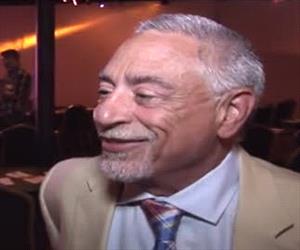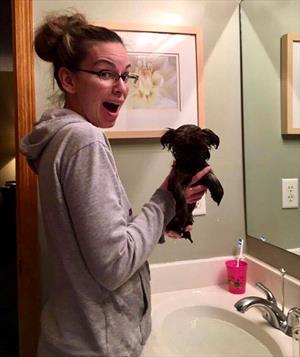Complaints pile up about Dr. Steve Abrams Memorial Foundation — Petsavers Inc.


Screenshot from YouTube posting
Alan Abrams appears in a video promoting a foundation named in honor of his father, a veterinarian who died in 2008.
When Sherri Schultz took her shih tzu to be spayed in April, she got bad news. Chloe was diagnosed with a liver shunt that might require a $4,000 surgery to correct. Disabled and with a husband recovering from a workplace injury, Schultz knew this life-saving intervention was beyond their means.
She looked for help online and found an organization with a stated mission to provide grants or no-interest loans to pet owners who cannot afford emergency treatments. It sounded like exactly what she needed.
Schultz contacted the organization, the Dr. Steve Abrams Memorial Foundation — Petsavers Inc. Almost immediately, she heard back from Alan Abrams, the CEO, general manager and son of the veterinarian for whom the foundation is named. “He was kind,” she recalled. Abrams promised to cover Chloe’s treatment “100 percent.”
She was relieved and grateful for Abrams' apparent generosity. What she didn't know was that Abrams, 55, has a long, shady record in the veterinary community that includes a six-month jail sentence for practicing veterinary medicine without a license and a string of lawsuits and complaints stemming from years as a veterinary practice consultant.
By the time she became aware of Abrams’ past, Schultz had become one in a chorus of people reporting problems with the foundation.
To receive the foundation's aid, Schultz had to find a veterinarian willing to sign on with its program. She approached Dr. Michael Foster, a veterinarian in southern Minnesota. Although he was skeptical about the arrangement, he agreed.
“We both wanted to save the dog,” Schultz said. “So he took the risk.” (Schultz is not her real last name, but the name she uses on social media. She asked to use her social media name in this article to protect her family's privacy.)
Chloe ended up not needing surgery, but treatment and diagnostics brought $1,500 in charges that Schultz believed would be covered by the foundation. Foster also performed two emergency surgeries on other pets referred by Abrams.
Within weeks, it appeared that the payments would not come easily. First, Abrams accused Foster of overcharging. Later, he said a check was in the mail. Today, five months later, the foundation has paid nothing for the surgeries or Chloe’s treatment.
Schultz and Foster are among at least 21 veterinarians, veterinary technicians, practice managers and pet owners who say that treatment and surgery approved by the 2-year-old foundation were never paid for.
Critics of the foundation include people who were identified by the foundation as references earlier in the year, before their experiences soured.
In a flurry of negative reviews on the foundation’s Facebook page last spring, six unrelated people claimed that clinics in California, Arizona, Minnesota and Missouri had not been reimbursed and, in one case, that a foundation check had bounced.
The foundation posted responses requesting patience and offering explanations for delays including “it was simply a matter of a misplace invoice [sic],” “our foundations [sic] founder was also sick for quite some time and we had no control over things,” and “many of our 60+ Sponsoring Practices felt it necessary to submit invoices far in excess of the approved amounts,” supposedly triggering an audit.
The conversation has since been taken down, and the option to post reviews removed, but one concerned observer took screenshots before it disappeared.
Veterinarians discussed their experiences with the foundation on closed Facebook groups and on confidential message boards of the Veterinary Information Network, an online community for the profession and parent of the VIN News Service. Veterinarians' reports suggested a pattern of the foundation failing to cover approved procedures and treatment.
In September, VIN News began contacting pet owners and veterinarians who had reported problems and a few who had been listed as references for the foundation. All of the 17 veterinarians or practice managers and four pet owners contacted claimed the foundation failed to make promised payments. Many provided documentation to support their stories.
Their reports cumulatively involve more than 100 animals, 23 practices in nine states, $205,000 in unreimbursed services and nearly $40,000 in veterinarian “sponsor” donations. In three cases, veterinarians reportedly received partial payments, and in a fourth case, after much badgering, a complete payment of $200.
The interviews draw a picture of a nonprofit that is at best unprepared to fulfill its promises or, worse, deliberately defrauding veterinarians and the public.
Abrams declined to comment for the article, citing mistrust of VIN resulting from long-standing tension with the organization. (See “Alan Abrams and VIN: A long, contentious history.”) He did not accommodate requests for the names of satisfied veterinarians and pet owners, contact information for foundation directors, financial information or notes from board meetings.
Economic euthanasias targeted
The Dr. Steve Abrams Memorial Foundation is a 501(c)(3) established in April 2015 in Phoenix, according to Arizona Corporation Commission online records. The foundation was formed by Alan Abrams to counter what's known as economic euthanasia — the killing of sick animals because the owners cannot afford treatment.
It’s named for his father, Dr. Steven Abrams, a veterinarian who practiced in Los Angeles. The elder Abrams died in 2008.
“Fifty-five years, [my dad] never euthanized an animal that didn’t have to be euthanized,” Abrams explains in a promotional interview from 2015 posted on YouTube. “So, if people didn’t have the money, he didn’t care, the pet came first.” In the video, a gravelly-voiced Abrams sports a tie, a trim gray goatee and a frequent smile. He projects an affable air.
The foundation also projects an air of celebrity. Abrams has claimed in correspondence and conversations with veterinarians that major league baseball players, particularly Dodgers, have donated millions to the foundation. MLB Hall of Famer Ferguson Jenkins is listed on foundation paperwork as a director. VIN News was unable to reach Jenkins to confirm his involvement.
As of Nov. 2, the Petsavers website claims to have saved 816 pets.
Veterinarians who wish to tap the foundation's promised largesse must make a donation to the foundation — $1,800 a year for general practice clinics or $2,400 a year for emergency/specialty/extended-hour practices. According to information on the foundation website, the clinic donations cover the charity's operations and advertising, while 100 percent of outside donations are allotted to pet-saving grants. Participating veterinarians may seek funding for an unlimited number of needy cases during the course of the year, potentially far exceeding the value of their donation.
In a twist on its mission, though, the foundation almost destroyed The Ladybug Fund, a smaller nonprofit that has worked successfully to curb economic euthanasia for almost a decade. The fund was established in 2008 in Colorado to provide financial help for pet owners in the region who can't afford needed emergency care for their animals.
It provides a monthly allowance to five emergency hospitals along Colorado’s Front Range. Nobody has to call anybody; the hospitals decide internally whether someone deserves the funds.
The fund was started with a donation from a concerned pet owner, and now relies mostly on trickle-funding — $2 to $5 donations requested on intake forms at the participating hospitals.
Its board looks over every case. “If something is inappropriate, we’re going to talk about it,” but that almost never happens, said Dr. Jon Geller, a veterinarian in Fort Collins and president of The Ladybug Fund board of directors. “Everybody’s heart is in the right place. I think seven or eight years of doing that without any problems, it put me in a position of maybe vulnerability, like, ‘Everybody’s nice.’ ”
Last year, Geller contacted the Abrams Foundation. He thought that by pairing up with the foundation, which apparently doesn’t put a cap on the number of cases covered, his organization could help more animals. The Ladybug Fund annual budget is around $30,000.
Abrams responded eagerly to Geller's idea. Within four months, Lady Bug-affiliated veterinarians had performed more than $30,000 worth of treatments and procedures on 13 animals with conditions including pyometra, dystocia and a perineal hernia.
The procedures were approved by Abrams in advance, said Geller, who understood that the approvals were “provisional,” meaning that the foundation would continue to do due diligence. If it turned out pet owners were misrepresenting their financial situation, the foundation would deal with the owner directly.
Geller found that Abrams was directly involved with every request, a responsibility that seemed to take a toll and cause erratic behavior.
“He would get paged and he would drag himself to the phone at 2 or 3 in the morning,” Geller recounted. “We have quite a few records of very irrational conversations.”
Geller started hearing complaints from some Ladybug hospitals: “Like, ‘This guy isn’t quite all there. He doesn’t seem to be psychologically stable,' ” Geller recounted.
Geller was upset by the reports but chalked them up to Abrams' exhaustion. “Alan, you need to get someone else to deal with your phone,” he told him.
Then the foundation started making excuses for why the first few cases hadn’t been reimbursed. The Ladybug Fund paid the hospitals, Geller said, and “we were left holding the bag.” The payments ate up half of the fund’s cash reserves.
After four months, The Ladybug Fund stopped referring cases to the foundation and focused on getting Abrams to pay up.
“This is where it became clear he was a scam artist. [We received] lots of excuses on why we weren’t getting paid,” Geller said. Explanations ranged from an oncologist finding a spot on Abrams’ lung; to his girlfriend, who worked for the foundation, going berserk on New Year’s Eve, physically attacking him and destroying all the records. After that episode, Abrams claimed it took four people working full-time a month to pull everything back together, Geller said.
Before giving up hope, Geller tried to make a deal with Abrams. If the foundation reimbursed them, Geller said, he would put out a good word for it at professional meetings. Abrams responded by offering a $1,000 kickback for everyone he signed up. “I thought that was weird,” said Geller, who had no intention of accepting the offer.
On March 3, the foundation cut a $10,000 check for The Ladybug Fund. “I have a crazy text message of [Abrams] describing his ride across Phoenix to try to find a bank that was open,” Geller said.
The check bounced four days later.
A pattern revealed
While some veterinarians sign up with the Abrams Foundation without prompting from clients, most of the practitioners and staff with whom VIN News spoke learned about the foundation through a client seeking assistance with a sick animal. That tended to put veterinarians under pressure, with little time to weigh their desire to help desperate owners and very sick animals against their suspicions that the promise of unlimited grants was too good to be true.
In multiple instances, the foundation referred new patients to newly recruited clinics quickly, before those clinics experienced delayed foundation payments.
Like Geller at The Ladybug Fund, other veterinarians reported that Abrams made himself available at all hours to review and approve applications, and rarely rejected any.
Pet owners say that in his communications with them, Abrams was initially sensitive, compassionate, available and well-informed about veterinary medicine. His email signature indicates a BVSc credential, which his LinkedIn profile shows was earned at the University of Florida. A BVSc is a veterinary medicine degree in the United Kingdom and some other countries, equivalent to a DVM in the United States. The University of Florida registrar says the school has never offered a BVSc.
Abrams routinely used recently signed-on veterinarians as references for prospects. When VIN News in October contacted four practices that had been given as references to a veterinarian five months earlier, representatives at each of the practices said they would not recommend the foundation. All claimed Abrams had failed to come through with promised grants.
Abrams also obtained pet photos and testimonials from pet owners early in the process, before the billing-and-payment step. Missourian Misty Simpson, whose boxer-Labrador-mix puppy Chika was approved for a foundation grant to treat a life-threatening gastroenteritis, sent a short thank you and photo.
“I was like, ‘OK, it’s the least I can do,’” Simpson said, looking back. But then, her veterinarian didn’t get paid. She posted complaints on the foundation’s Facebook page; they were removed, while her tribute remained in place on the foundation website.
She contacted Abrams. “I want my dog off the site,” she told him, warning that she’d go public with her complaints on social media. “I went full-blown threatening,” she told VIN News.
Her veterinarian received a check three weeks later, she said. What she didn't realize is that the check bounced. Her testimonial and dog’s photo were still on the website as of Nov. 2.
In another case reported by a Southern California clinic, a client was approved for a no-interest loan from the foundation. The client’s mother repaid the loan in the form of a “tax-deductible donation” to the foundation. However, the clinic said it never saw any money, which suggests that the foundation pocketed the payments.
Abrams’ friendly, accessible approach continued even as payments were not received. One hospital administrator said that when she complained to him about an outstanding bill, Abrams inexplicably bragged about clinics to whom he owed many thousands more.
More typically, he served up excuses, including but not limited to: misplaced invoices; incorrect clinic names and addresses on payments; changing banks; payments sent but somehow not received; clinics submitting incomplete paperwork or bills far exceeding the agreed-upon amounts; a bookkeeper who took a much-needed vacation; a bookkeeper who quit without notice; lackluster, revolving-door staff; his own poor health; having to move twice due to a stalker; the person dealing with finances was deaf and couldn’t hear the phone ring; and a former information-technology director planted a ransomware virus in the server, destroying tens of thousands of files.
That last reason, described in what appears to be a form email sent to at least two practices, represented the second time in the foundation's two-year existence that its records were said to have been catastrophically lost. The first was the instance described to Geller of Abrams' girlfriend/employee going berserk.
VIN News found only four instances in which payments were made. In one case, a Scottsdale, Arizona, hospital received $3,400 from the foundation for two approved procedures as an enticement to sign on. After becoming a sponsor, the clinic treated 10 more pets referred by the foundation. Those fees, totaling $10,000, were not reimbursed.
One pet owner, who posted a complaint on a charity watch site, said that after two months of “begging” the foundation, it did pay her $200 veterinary bill.
Abrams also paid $257 toward a $2,000 veterinary bill for a pet owner in Lake Havasu City, Arizona, after insisting he would cover the entire cost. That payment was made, the pet owner said, after she told him that she had recorded two of their phone calls, during which she detailed the problems he created for her with her veterinarian. A testimonial for one of her dogs is among 14 “pets saved” stories listed on the foundation website — a testimonial she regrets giving.
Finally, in the case of The Ladybug Fund, after the first check for $10,000 bounced, Abrams sent a check for $5,000, which cleared.
The payment came with a colorful story, Geller said: “[Abrams] told me that he had to borrow it from some Italian guys who charged him 51 percent interest.”
In calls and emails with prospective sponsors, Abrams has claimed the foundation has up to $9 million in funding and has approved some $500,000 in surgeries. If the foundation raised millions and spent less than $1 million, it's unclear why it would need to borrow $5,000 at a usurious rate.
Abrams on the offensive
Abrams has logged complaints of his own. On Facebook and in correspondence to practices, he's said veterinarians inflated their invoices.
Veterinarians interviewed by VIN News said that their invoices were in line with approved estimates, came in under approved amounts, or were billed at steeply discounted rates.
Dr. Ginger Tran, a disappointed foundation sponsor in North Carolina, said Abrams encouraged her to be expansive in her estimate. For example, she said, in the case of a cat that needed full-mouth extractions due to severe stomatitis, Abrams suggested she take the broadest interpretation of risk and include neutering surgery in an estimate. With two promised grants of $4,800 unpaid, Tran now mistrusts the foundation. She suspects it uses invoices and other paperwork from veterinarians to falsely document the use of donor funds.
Some veterinarians and pet owners said they found that their repeated requests for payment, especially if they went public, caused Abrams to attack.
In response to a request for payment on a nearly 3-month-old invoice from Foster, the veterinarian in Minnesota who treated the shih tzu Chloe, Abrams wrote: “It saddens me that I have been made to jump through hoops with you for simply doing my job, for which, by the way, I earn a grand total of $1 per YEAR. I believe that you have completely either lost the entire message of what we do here, or even more likely, simply don’t care.”

Photo courtesy of Sherri Schultz
Sherri Schultz sent this photo, taken as she gave Chloe a bath, to Alan Abrams when she believed his foundation would cover her dog’s veterinary costs.
Chloe's owner, Schultz, was rocked by the change of tone, as well. Through the application and diagnosis process, she had been in regular friendly, even personal, contact with Abrams on Facebook messenger. As a Christian who follows the Torah, she connected with Abrams, who claims to be a rabbi. (His rabbinical status has been challenged in the press.)
“We kind of bonded,” she said. “We’d speak Hebrew to each other.”
Then Schultz saw in reviews on the foundation’s Facebook page that a check to another clinic had bounced. She alerted Foster, who filed a fraud claim with his credit card company to reverse the charge for his donation to the foundation. Abrams turned on Schultz in profanity-laced, all-cap messages.
He mocked her religion, accused her of stirring up trouble, told her it was none of her business, and said that because of her, many animals were going to die.
She told him to stop writing to her, threatening to post a screenshot of their messages on Facebook. He stopped.
The Schultzes eventually managed to pay their veterinary bill with a property-tax refund that they’d planned to use for electricity and credit-card bills.
Foster said that in another foundation-approved case for which a grant never came through, the pet owner gave up her apartment and moved in with her parents to pay off her bill.
While people at most of the veterinary clinics contacted by VIN News never met Abrams in person, communicating with him only by phone, email, text or private messages on Facebook, in at least one instance, he made an in-person recruitment visit.
“I came in one morning and Alan was here sitting at my desk in my chair talking to Earl [the clinic CEO],” said Stephanie Babcock, head registered veterinary technician at a clinic in Santa Monica, California.
Abrams told them how he wanted to carry on his father’s legacy of never euthanizing a pet for economic reasons. “It all just sounded really awesome,” Babcock said. “I mean, gosh, every vet is faced with that situation all the time.”
The clinic signed up, donated $2,400, and subsequently provided approved treatments for six animals, including a cat that had been hit by a car, a dog that swallowed tiny tennis balls, and a dog horribly wounded from an attack by a dog pack. The invoices totaled $23,000. The foundation paid none of them.
Abrams told Babcock that someone named Cindy would be her direct contact at the foundation. “Cindy never one time answered the phone,” Babcock said. “I’ve never talked to her. And that number, I tried to call it the other day, and that number is now another business.”
A history of trouble

VIN News Service photo
The address to foundation headquarters leads to a mailbox at a Pack Ship and Print Center in a Phoenix strip mall.
After payments didn’t arrive, veterinarians, practice managers and pet owners started looking up Abrams on Google, a step they came to regret not doing earlier.
They discovered he was accused in California in 1993 of posing as a veterinarian. Los Angeles County Superior Court records show Abrams pleaded guilty to three counts of practicing veterinary medicine without a license and was sentenced to six months in jail.
They found an article from 2012 detailing allegations that as a rabbi of questionable provenance, Abrams stole from a nursing home resident in her 90s. The Jewish Journal article reports at least nine lawsuits against Abrams, an arrest “in connection with the theft of $73,000 reported by a group of medical doctors,” and a dozen misdemeanor counts for writing bad checks.
In addition, members of VIN discovered troubling reports from colleagues that Abrams misled and manipulated clients while working as a veterinary consultant.
As they unspooled his history, they wondered, how does he keep getting away with it?
Nikki Frost, practice manager for a Prescott, Arizona, pet emergency hospital, believes that Abrams was clever about his targets. “Veterinarians want so desperately for there to be a solution,” she said, “but they won’t get upset and angry. They take it as a lump.”
Dr. Karen Kurowski, whose Southern California clinic is out $5,000, has a similar perspective. “We trusted that it was legit,” she said. “I was upset. I really wanted to take action. But there were not many good options.”
Several people said they planned or threatened to report Abrams but didn’t, either because they didn’t know whom to contact or because their intention was lost in the midst of busy days. Or the amounts to be recovered seemed not worth the effort and heartache.
In a few cases, people who felt burned by the foundation filed complaint forms for tax-exempt organizations with the IRS, reported bounced checks to the police or district attorneys, and/or posted to online forums.
With alleged victims scattered around the country, no one had a unified sense of how many people are affected or what, collectively, can be done. The number of veterinary clinics signed on as foundation sponsors in unknown; the organization's website does not list them.
Based on the foundation’s self-reporting of 816 pets saved, the cases identified by VIN News represent almost 12 percent of animals with which the foundation has been involved.
Using the experiences of the 23 practices covered by VIN News as a guide, a sponsoring practice takes an average four to five foundation-approved cases at an average cost of about $2,000 each. Expanding the figures to 816 animals puts the aggregate cost of veterinary services at more than $1.6 million.
The number of clinics that believe they were burned by Abrams also is unknown. Again extrapolating from the experience of the subset of foundation sponsors, the 816 animals would have been seen at roughly 185 practices. If each of those practices donated $1,700 to the charity (Abrams gave some clinics a break on the membership fee), the foundation conceivably raised more than $314,000 to cover its overhead in its first two years.
Those figures are a guess. As for outside donations received by the foundation, no public record exists other than Abrams’ claims that he has raised millions.